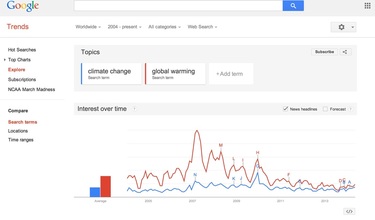
My colleague Bill Anderegg and I have been using Google Trends to try to make sense of events and trends in climate science communication. The result is a new (open access) paper in the journal Environmental Research Letters. Effectively, Google Trends allows us to look at how the number of searches in Google for climate change related queries varies across space and time. A couple of ideas to take away from our results:
1) Public interest in climate change, as measured by the volume of searches for the issue, has decreased significantly since a peak in 2007. The evidence for serious anthropogenic climate change has only gotten worse during this time.
2) The public searches for "global warming," not the more comprehensive "climate change." As a community, we need to use the search terms that are being engaged by the public.
3) Major climate communication events, positive or negative, generally have a very short half-life in the media. A few days at best.
4) Google Trends is the harbinger of a new era for the study of effective science communication, in that it can provide open access to historical and real time information on public interest in a topic. It's a great complement to traditional survey methods.
Ultimately, my hope is that our research serves as an example of how Google Trends can help improve the dialogue around climate change by providing insight into what the public is searching for information about, where they are, and when they are searching.
Anderegg, W.L. and G.R. Goldsmith 2014. Public interest in climate change over the past decade and the effects of the 'climategate' media event. Environmental Research Letters 9, 054005.
 RSS Feed
RSS Feed
